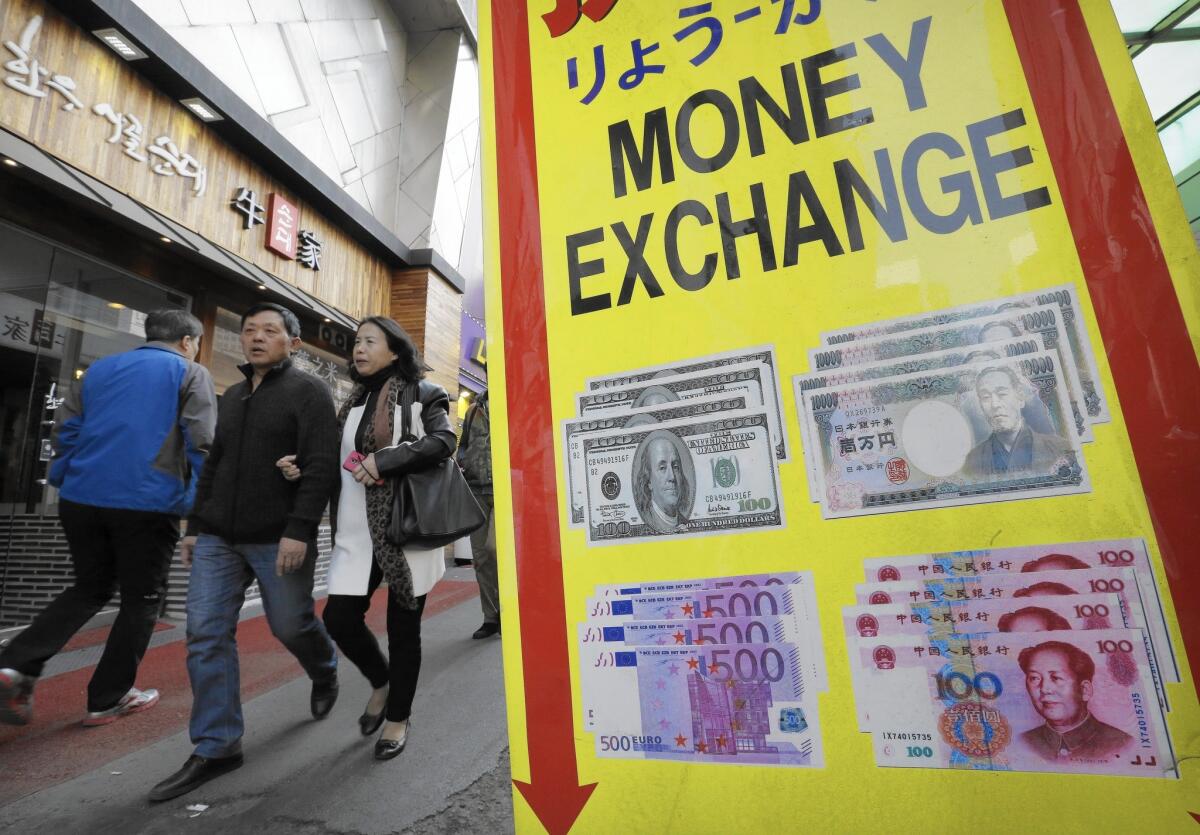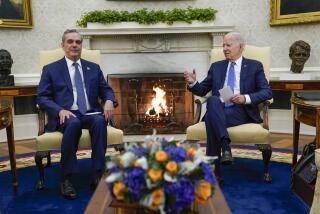Key U.S. allies join China-led Asia infrastructure bank

- Share via
Reporting from washington — As economic leaders gather here this week for meetings of the International Monetary Fund and the World Bank, China is set to kick off a rival infrastructure development lender that promises to shake up the traditional American-led global financial order.
Beijing on Wednesday is officially announcing the founding members of its Asia Infrastructure Investment Bank, which will use initial capital of $50 billion — and eventually $100 billion — to invest in roads, cellphone towers, railways, airports and other infrastructure projects across Asia.
Experts said the new China-led bank could offer much-needed relief to a region that will need an estimated $8 trillion in infrastructure investment by 2020, far more than the World Bank or the Japan-led Asian Development Bank can provide.
But the U.S. has lobbied against the new institution, and to the surprise and embarrassment of the Obama administration, the list of participating nations includes nearly every major economy, except for the U.S. and Japan.
In a geopolitical coup for China, even stalwart American allies such as Britain, Australia and South Korea are lining up to join the new institution, first proposed by Chinese President Xi Jinping in October 2013.
“This has been a diplomatic success for China, not for the U.S.,” said Domenico Lombardi, director of the Global Economy program at the Centre for International Governance Innovation in Ontario, Canada.
U.S. officials have voiced concerns about whether the new institution will abide by rigorous international standards on banking, labor and the environment. But Washington also fears that Beijing will use the bank to assert itself as a global player and diminish U.S. influence in Asia and elsewhere.
“The question from the beginning is: Will this bank be an arm of China’s foreign policy and strategy, or will this be an international bank? This remains to be seen,” said Bonnie Glaser, a senior advisor for Asia at the Center for Strategic and International Studies and a consultant on China for the U.S. government.
“This is certainly a piece of evidence that the U.S. imprimatur is not necessary for other countries to become involved in projects that are being initiated by China,” she said.
To a large degree, Washington has only itself to blame for the rise of the bank. China, Brazil, Russia, India and other rising economic powers had long sought a bigger voice in international organizations such as the IMF and the World Bank.
More than four years ago, President Obama pledged to world leaders gathered in Seoul that the U.S. would overhaul the IMF’s governance to give more voting power to China and other rising nations.
The change would have reduced U.S. voting power by lowering its so-called quota shares to 17.4% from 17.7%. China’s would rise to 6.4% from 4%, and for all developing countries, quotas would increase to 42.4% from 39.5%.
But congressional Republicans refused to ratify the proposal, prompting searing criticisms from other countries about America’s dysfunctional political system and refusal to recognize the shifting balance of influence in the world.
“In some sense, because we were unwilling to give some of these emerging-market countries a small increase in their voting share in the IMF, they’ve gone off and started another institution without us,” said Edwin Truman, a senior fellow with the Peterson Institute for International Economics.
The spat over the China-led bank is just one of several rivalries between the U.S. and China as each nation jockeys for economic and political influence over the fast-growing Asia-Pacific region.
The Obama administration is working in the coming months to complete a long-delayed Trans-Pacific Partnership agreement, which would promote trade among 12 Asia-Pacific nations — including the U.S. and Japan, but not China. Beijing is proposing a rival regional trade pact.
The delay in reforming IMF governance was all the more galling to countries such as China because the proposal would not be costly to the U.S. or remove Washington’s long-held exclusive veto power.
“It strengthened China’s resolve to shape the international financial architecture by being more proactive to establish new institutions,” Lombardi said.
The IMF, the most prominent international financial institution, is a lender of last resort with hundreds of billions of dollars at its disposal through commitments from scores of nations.
Like the World Bank, it was formed in the aftermath of World War II when the U.S. and Allied powers designed the global financial architecture. By tradition, the World Bank has been headed by an American and the IMF by a European citizen.
In a speech in March, when it was apparent that the Chinese bank had won sweeping support from U.S. allies, Treasury Secretary Jacob L. Lew said the U.S. stood ready to welcome the new international institution, provided that it “share the international community’s strong commitment to genuine multilateral decision-making and ever-improving lending standards and safeguards.”
The Asia infrastructure bank would most directly compete with the World Bank, which also funds infrastructure and development projects around the world, with a focus on poorer countries.
Jim Yong Kim, the World Bank’s president, welcomed the arrival of another lender, saying it would ramp up much-needed infrastructure building.
More than 45 nations and territories reportedly applied to become founding members of the China-led bank, with Britain, Australia, France, Norway, Portugal, Iceland and Hong Kong all signing up last month. On Tuesday, Reuters reported that Canada, another holdout among major U.S. allies, was “actively considering” joining the bank.
“This is a real warning shot to the U.S., especially to the U.S. Congress,” said Peter Petri, a professor of international finance at Brandeis University, referring to the broad support given to the Chinese-led institution.
China has rejected applications from North Korea and Taiwan, the latter over disagreements about the self-governing island’s name. Beijing considers the island a breakaway province.
Only a few months ago, some American allies sounded as if they, too, were opposed to the Chinese-led effort. Australian diplomats, for example, publicly voiced concerns about transparency and lending standards of the proposed institution.
Clyde Prestowitz, a Washington consultant and former trade negotiator in the Reagan administration, said many countries had reasons for “jumping ship.” It’s well known that the British, for example, want to be the center of yuan trading as China’s currency gains international clout.
Australia, meanwhile, wants to keep selling its iron and coal to China — and infrastructure spending means more demand for steel and other commodities.
“They all want to curry favor with Beijing,” he said.
Experts said it may be in the U.S. interest to embrace the institution too.
Though China’s state-run news agency has crowed about the global support for the bank, Nicholas Lardy, a China economics scholar at the Peterson Institute, said that’s not what he heard when he spoke with officials affiliated with the new institution at a high-level meeting in Beijing last month.
“They weren’t triumphalist at all,” Lardy said. “They didn’t say anything anti-U.S. They didn’t make a big thing about how the U.S. had failed to persuade its closest allies not to participate. Some of the facts just spoke for themselves.”
Lee reported from Washington, Kaiman from Phoenix.
More to Read
Inside the business of entertainment
The Wide Shot brings you news, analysis and insights on everything from streaming wars to production — and what it all means for the future.
You may occasionally receive promotional content from the Los Angeles Times.











